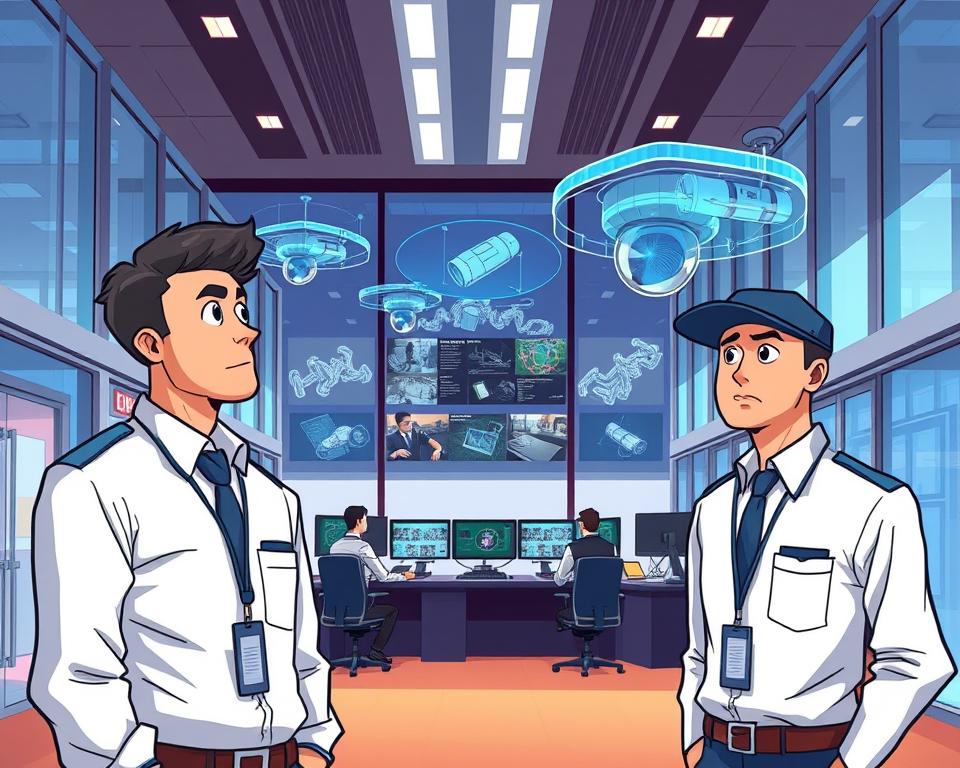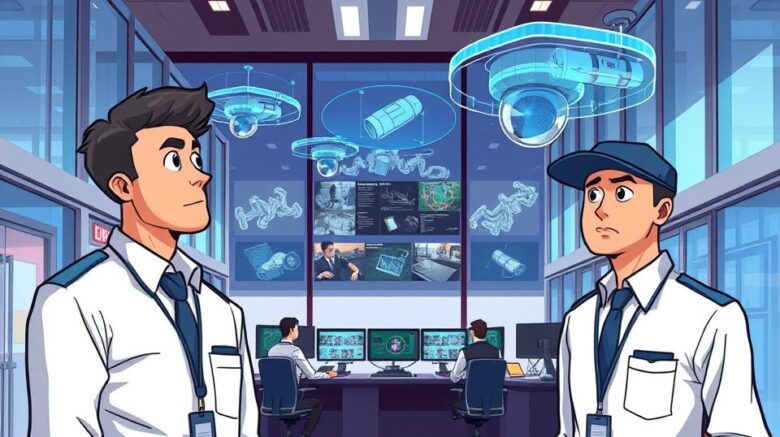Maximizing Safety with Hospital Security Guards
Can you imagine that hospitals deal with around 30 violent incidents per day? This alarming figure highlights the essential role of Hospital Security Guards. They protect not just patients but also staff and confidential information. In the rapidly evolving health sector, strong Healthcare Facility Security is paramount. It focuses on forming safe zones where patients obtain services without threats of violence or information breaches.
Partnering with experienced firms like Divine Protection Services enhances Medical Center Security Services. This ensures security stays front and center without limiting accessibility. This article examines how construction site security solutions and surveillance systems can significantly improve security protocols. It addresses both inside and outside dangers efficiently.

Principal Learnings
- Hospital Security Guards are crucial for defending patients, staff members, and sensitive records.
- Healthcare Facility Security is necessary to curb violence and preserve confidentiality.
- Integrated security systems enhance the overall effectiveness of medical center security services.
- Collaboration with firms like Divine Protection Services ensures tailored security solutions.
- State-of-the-art technologies are the foundation of present-day healthcare security solutions.
- Managing openness and privacy is crucial for efficient hospital security standards.
The Importance of Hospital Security
Hospital security is vital for protecting patients, employees, and private information. The rise in violence in medical settings highlights the need for strong Hospital Security Guards. These officers are indispensable for preserving a secure setting and protecting everyone’s rights and dignity.
Applying solid Healthcare Facility Security tactics is critical to deter hostile actions. This supports the creation of a compassionate space, elevating the patient and family experience. It also ensures compliance with laws like HIPAA, which mandates secure access control to protect Protected Health Information (PHI). These actions not only defend patients but also nurture trust between healthcare teams and their communities.
| Security Measure Type | Significance | Regulatory Conformity |
|---|---|---|
| Access Control Systems | Block unauthorized access and entry | Vital for meeting HIPAA requirements |
| Surveillance Cameras | Observe events and prevent illicit acts | Aids in meeting safety regulations |
| Emergency Response Plans | Enable swift reaction to emergencies | Compliant with safety and emergency management guidelines |
| Training for Security Personnel | Train employees in crisis response skills | Guarantees adherence to security standards |
Committing to comprehensive security solutions and staff training is indispensable for protecting hospitals and health centers. These frameworks establish a secure, compliant environment, fundamental for delivering quality care to patients.
Role of Hospital Security Guards
Hospital security personnel perform a critical role in safeguarding hospitals. They supervise entry areas to prevent unauthorized access, address emergencies, and utilize conflict de-escalation to avoid threats. Trained by Divine Protection Services, they recognize and mitigate signs of distress or violence.
Their presence is key to the safety and well-being of patients and staff. They secure the hospital’s processes, critical for a healing setting. By delivering security, they enrich patient care and lower risks.
High-Tech Tools for Hospital Security
Current healthcare facilities incorporate Advanced Technologies to enhance security efforts. Medical Center Security Services skillfully combine technologies such as AI-enabled cameras to boost monitoring functions. These systems deliver instant monitoring and insights, empowering personnel to react to incidents quickly.
A principal component of Healthcare Security Solutions is implementing access control systems. These systems restrict entry to sensitive areas, ensuring that only authorized personnel can access critical zones. By leveraging biometric authentication, medical centers can integrate extra security around patient data and vital medical apparatus.
AI-enhanced security systems are fundamental to physical protection. Facial recognition and behavior detection enable security personnel to respond promptly to security breaches. High-level video analytics aids in operational choices, offering nonstop monitoring of hospital premises. This contributes to a protected setting for staff and patients alike.
| Tech Tool | Deployment | Advantages |
|---|---|---|
| AI-driven Surveillance | Real-time monitoring | Rapid hazard recognition |
| Access Control Systems | Regulated entry | Guarding important sections |
| Facial Recognition | Biometric verification | Blocking illicit entry |
| Video Analytics | Surveillance management | Insight-based strategies |
Cutting-Edge Technologies shield hospital belongings and foster a safe environment for all. By allocating resources to these innovative tools, medical centers can stay alert to security risks. This upholds superior patient care standards.
Healthcare Facility Security Strategies
Solid Healthcare Facility Security frameworks are crucial for defending patients, staff, and visitors in healthcare centers. Executing detailed risk analyses is the basis of these approaches. By identifying vulnerabilities, healthcare facilities can craft specific protocols for various scenarios. This improves their readiness for whatever incidents may arise.
It’s vital to encourage reporting of unusual behaviors and threats. Medical centers need frameworks in place to react swiftly to those reports. This anticipatory position in Healthcare Facility Security builds a community-wide safety mindset.
Handling visitor flow is a fundamental element of Medical Center Security Services. Verifying that only approved individuals enter sustains a protected environment. Watching over patient-caregiver interactions helps diminish risks. This creates a safer space for all. Below is a table outlining key components of effective security strategies.
| Security Component | Overview | Outcomes |
|---|---|---|
| Risk Assessments | Uncovering vulnerabilities and gauging potential threats. | Improves preparedness and response times. |
| Incident Reporting | Motivating staff and visitors to flag unusual behavior. | Supports quick reactions to dangers and boosts awareness. |
| Visitor Management | Protocols for monitoring and controlling access to facilities. | Enhances security and reduces unauthorized access. |
| Staff Training | Ensuring staff receive comprehensive security training. | Equips staff with capabilities to address security concerns. |
Training Security Personnel Effectively
Comprehensive education of healthcare security teams is essential for ensuring safety in hospitals. Ongoing learning aids employees in adjusting to emerging threats. It also boosts their ability to respond well in different situations.
Divine Protection Services highlights nurturing excellent situational awareness in security officers. This includes learning conflict management skills for high-stress interactions. Frequent drills and mock scenarios strengthen procedures. Employees develop skills to tackle threats promptly while safeguarding dignity and respect.
This training strategy for security teams extends past basic defense techniques. It encourages a climate of safety and professionalism across healthcare facilities. By focusing on core competencies, hospitals ensure their security teams can handle challenges effectively.
Compliance with Regulatory Standards
Adhering to Regulatory Standards is critical for medical centers striving for safety and credibility. HIPAA, in particular, demands secure entry controls to shield Patient Health Information (PHI). These procedures stop unapproved access and guard against data leaks.
Medical centers can enhance their compliance by implementing comprehensive policies. They encompass routine inspections, employee education, and explicit incident reporting methods. These actions not only secure patient welfare but also strengthen community trust.
Firms such as Divine Protection Services deliver custom compliance plans for healthcare institutions. Their proficiency in Hospital Security Services assures that security personnel are able to satisfy regulatory demands.
Dedication to compliance lowers risks and forges reliable patient-provider connections. A proactive view on regulations aids the entire healthcare infrastructure.
Hospital Security Officers in Practice
Hospital Security Guards are crucial for protecting medical environments. Their duties are evident in various real-world instances, demonstrating a forward-thinking approach. For instance, they oversee disputes in waiting rooms, swiftly settling them to avert escalation.
In high-pressure instances, these officers guide individuals to protective zones, assisting them as required. This practice secures those who are vulnerable and upholds a serene atmosphere. Their collaboration with authorities during critical events spotlights the role of Professional Healthcare Security. They frequently act as initial responders.
Education provided by Divine Protection Services trains these guards to respond to emergencies adeptly. They are taught to apply regulations while preserving everyone’s dignity. This fusion of authority with compassion establishes them as indispensable to the healthcare team. They commit to ensuring security and protection for everyone on site.
Customizing Security Solutions for Healthcare Facilities
Hospitals deal with particular security threats that call for a bespoke strategy. Adapting Security Solutions is vital for addressing these concerns, providing a secure environment for patients and personnel. Partnering with professionals like Divine Protection Services lets hospitals design security programs suited to their unique demands.
A well-rounded security program covers critical areas like violence prevention and medication security. By using advanced technologies, facilities can boost their safety measures while adhering to HIPAA standards. This frequently encompasses visitor oversight systems and responsive access control methods tailored to evolving needs.
The responsibilities of Medical Facility Guards are also essential. They undergo dedicated training to address security events and remain continually alert. Their visibility deters potential threats and instills confidence in employees and patients.
Presented here is a table depicting how Adapting Security Solutions resolves multiple healthcare challenges:
| Issue | Personalized Remedy |
|---|---|
| Violence Prevention | Educating Medical Facility Guards in conflict de-escalation methods |
| Medication Security | Installation of secure medication storage and monitoring systems |
| Visitor Management | High-level visitor vetting and credential issuance procedures |
| Access Control | Adaptive access control systems that adjust based on facility activity |
By carefully planning and partnering with the right organizations, healthcare facilities can establish a strong security posture. This stems from Adapting Security Solutions to their distinctive demands. Merging human supervision with tech tools greatly enhances protection, resulting in a safer, more efficient medical environment.
The Bottom Line
Securing the safety and health of patients, personnel, and confidential data is critical in hospitals. Hospital Security Guards today employ cutting-edge technologies and instruction to fight contemporary risks. This development not only defends physical locations but also nurtures trust between patients and healthcare staff.
Tailored Healthcare Security Solutions enable hospitals to lead in the evolving security environment. Working with veteran companies like Divine Protection Services empowers medical facilities to address security issues competently. By blending personnel training with cutting-edge technology, hospitals can foster a secure environment for healing and care.
The health sector grapples with escalating risks, making professional security steps vital. Medical centers need to embrace these advancing methods to protect their premises and maintain operational dignity.
